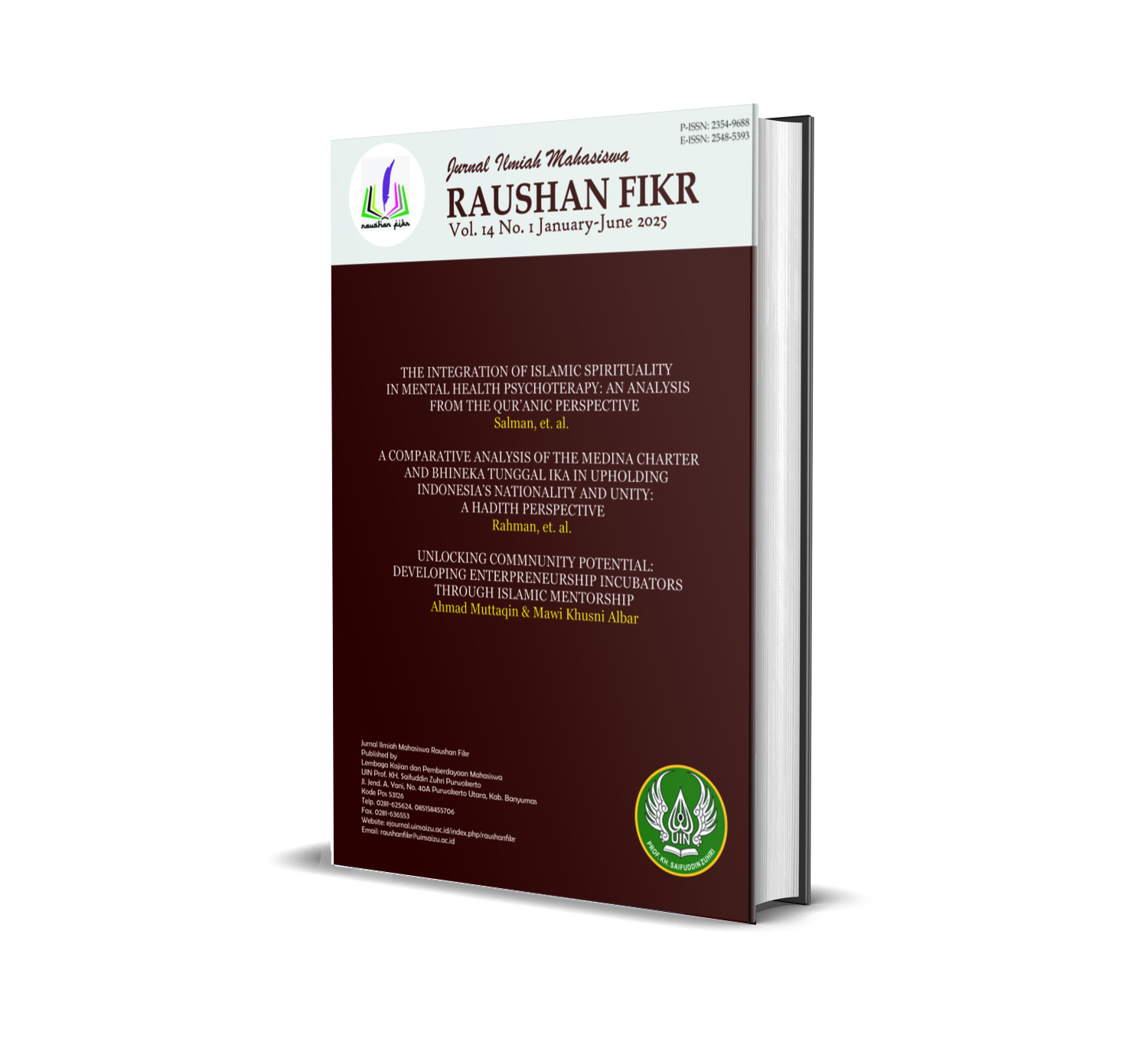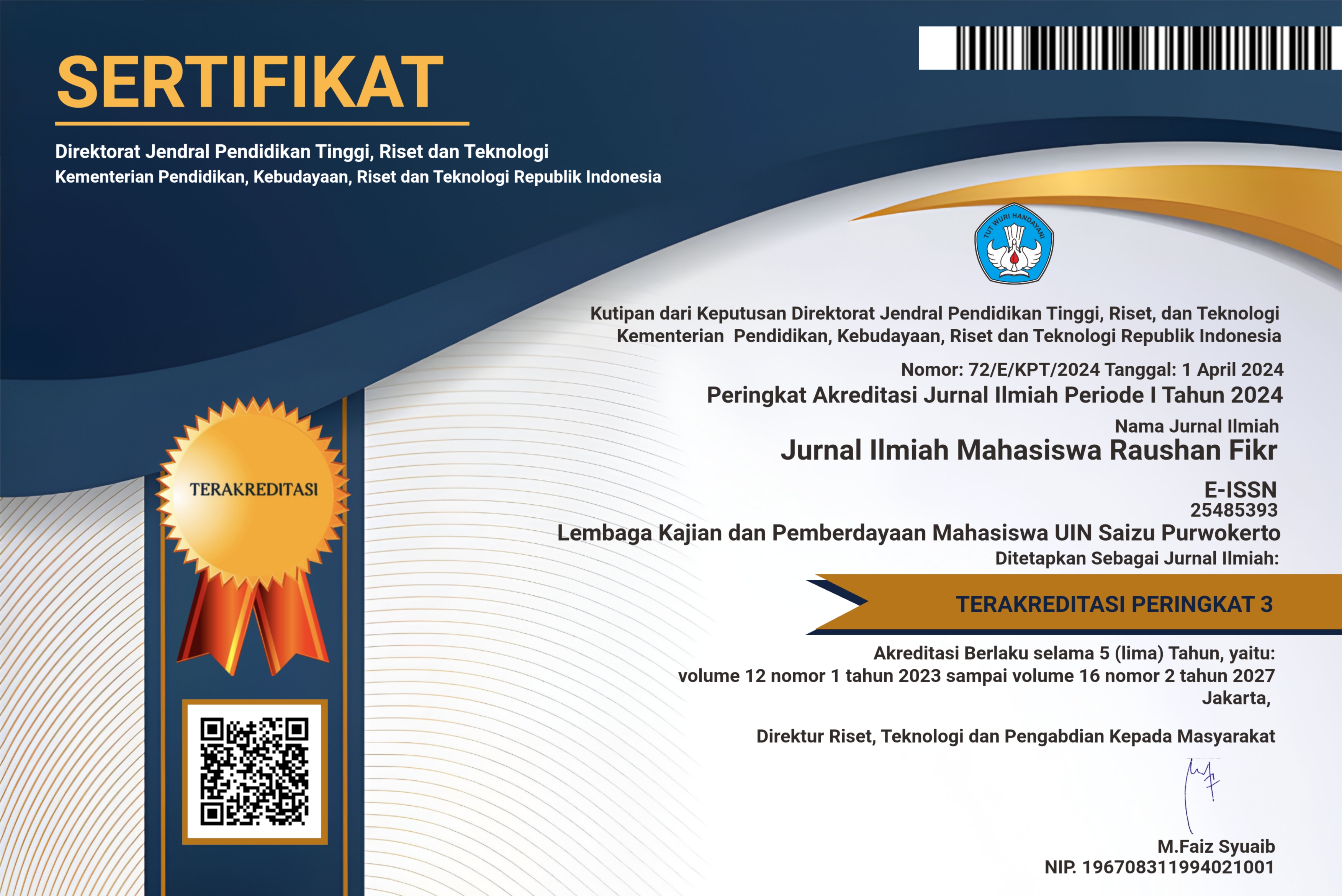The Integration of Islamic Spirituality in Mental Health Psychotherapy: An Analysis from The Qur’anic Perspective
DOI:
https://doi.org/10.24090/jimrf.v14i1.12169Keywords:
Spirituality, psychotherapy, mental healthAbstract
The purpose of this research is to examine the integration of Islamic spirituality in mental health psychotherapy: an analysis from the Qur’anic perspective. This study is a type of library research. The data for this study was collected, examined, and then described using the gathered information. The data collection methods were sourced from relevant books, texts, and articles. This research also employed descriptive analysis techniques aimed at clarifying positive perceptions towards spiritual training activities based on the Qur’anic perspective. The findings indicate that the integration of Islamic spirituality can have implications for mental health. Spiritual training activities include two main components: therapy through reading and understanding the meanings of the Qur’an as shifa (healing) and daily repentance prayers (dua taubah) performed by patients/clients during the rehabilitation processDownloads
References
Ancok, Djamaludin. Fuad Nashori Suroso. 2011 Psikologi Islam; Solusi Islam Atas Prablem Prablem Psikologi, Yogyakarta: Pustaka Pelajar, Cet. ke IV.
Ahmad A’toa’, M., & Mardiana, M. N. (2021). Zikir dan Tafakkur Asas Psikoterapi Islam. Jurnal Pengajian Islam, 14(1), 204–217.
Alawiyah, D., & Handayani, I. (2019). Penanaman Nilai Spiritual dalam Dimensi Psikoterapi Islam di PP. Rehabilitasi Salafiyah Syafi’iyah Nashrun Minallah. Konseli: Jurnal Bimbingan Dan Konseling (E-Journal), 6(1), 23–32.
Asmadi. 2008. Teknik Posedural Keperawatan Konsep dan Aplikasi. Jakarta: Salemba Medika.
Curlin FA. 2005. When Patients Choose Faith Over Medicine Physician Perspectives on Religiously Related Conflict in the Medical Encounter: Jurnal Intern Med.
Elzaky, Jamal. 2011. Buku Induk Mukjizat Kesehatan Ibadah, Jakarta: Zaman.
Fitri, K., Shofiah, V., & Rajab, K. 2023. Kajian Model Psikoterapi Ikhlas untuk Mencapai Kesehatan Mental. Psikobuletin: Buletin Ilmiah Psikologi, 4(1), 32. 49-81.
G. Harold, Koenig. “Religion, Spirituality, And Medicine: Research Findings and Implications for Clinical Practice,” dalam Jurnal from The Departments of Psychiatry and Medicine, Vol. 0038-4348, No. 9712.
Haidarsyah, Muhammad Khasfillah, dkk. 2024. Peran Islamic Psychotherapy untuk Meningkatkan Kondisi Mental Health. Jurnal Psycho Aksara Jurnal Psikologi. Vol. 2, No. 1.
Hawari, D. (1996). Al Qur’an: Ilmu Kedokteran Jiwa dan Kesehatan Jiwa. PT Dana bhakti Prima Yasa.
Hepi Wahyuningsih, “Religiusitas, Spiritualitas, dan Kesehatan Mental: Meta Analisis,” dalam Jurnal Psikologika, Vol. 13, No. 25, Januari 2006.
Isep Zainal Arifin. 2012. “Bimbingan dan Konseling Islam Untuk Pasien Rawat Inap di Rumah Sakit,” dalam Jurnal Ilmu Dakwah, Vol. 6, No. 19. 45-76.
Jalaludin. 2006. Psikologi Agama. Jakarta: Raja Grafindo persada.
Lajnah Pentashihan Mushaf Al-Qur’an. 2009. Tafsir Tematik AlQur’an Kesehatan Dalam Perspektif Al-Qur’an, Jakarta: Penerbit Lajnah Pentashih Mushaf Al-Qur’an, Cetakan pertama.
Muid, Abdul. 2019. Spritual sebagai terapi Kesehatan Mental: Perspektif Tafsir Alquran. Jakara: PTIQ Press
Mujib, Abdul dan Jusuf Muzakkir. 2002. Nuansa-Nuansa Psikologi Islam. Jakarta: Raja Grafindo Perkasa.
Najati, Mohammad Utsman. 2010. Psikologi Qur’ani Terj. Al-Qur’an Wa Ilmi An-Nafs. Bandung: Penerbit Marja.
Nugraha, F. S., & Wadin, D. (2019). Implementasi Kompetensi Sikap Spiritual Kurikulum 2013 Pada Proses Pembelajaran Pendidikan Agama Islam Jenjang Sekolah Menengah Atas (Sma). Ta’dib: Jurnal Pendidikan Islam, 8(1), 583–590.
Prasetyo, Agus. 2016. Aspek Spiritualitas Sebagai Elemen Penting dalam Kesehatan: Jurnal Kesehtan Al-Irsyad, Vol. Ix, No 1, 20-65.
Rayan, S. (2012). Islamic Philosophy of Education. Journal International Journal of Humanities and Social Science, 2(19). 65-112.
Shihab, M. Quraish. 2009. Tafsȋr Al-Misḫâh. Tanggerang Selatan: Lentera Hati, Vol. 7.
Sumanto. 2014. Teori dan Metode Penelitian. Yogyakarta: CAPS (Center of Academic Publisjing Service).
Trimulyaningsih, N. (2019). Efektivitas psikoterapi islam untuk meningkatkan kesehatan mental: sebuah studi meta analisis. Jurnal Psikologi Islam, 6(1), 43–56
Yesi Dwi Andari, H. H. P. (2023). Kecemasan Istri Prajurit TNI-AD di Asrama Militer Yonif 511 Kota Blitar pada saat Suami Bertugas ke Merauke. Al-Ihath: Jurnal Bimbingan Dan Konseling Islam, 3(1), 64–74.
Yesi Dwi Andari, H. H. P. (2023). Kecemasan Istri Prajurit TNI-AD di Asrama Militer Yonif 511 Kota Blitar pada saat Suami Bertugas ke Merauke. Al-Ihath: Jurnal Bimbingan Dan Konseling Islam, 3(1), 64–74.
Zed, Mestika. 2008. Metode Penelitian Kepustakaan. Jakarta: Yayaysan Obor Indonesia.
Downloads
Published
How to Cite
Issue
Section
License
Copyright (c) 2025 Salman, Muhmmad Darul Amin Sitorus, Syawaluddin Nasution

This work is licensed under a Creative Commons Attribution-NonCommercial-ShareAlike 4.0 International License.
Authors who publish with this journal agree to the following terms:
- Authors retain copyright and grant the journal right of first publication with the work simultaneously licensed under a Creative Commons Attribution-NonCommercial-ShareAlike 4.0 International License that allows others to share the work with an acknowledgement of the work's authorship and initial publication in this journal.
- Authors are able to enter into separate, additional contractual arrangements for the non-exclusive distribution of the journal's published version of the work (e.g., post it to an institutional repository or publish it in a book), with an acknowledgement of its initial publication in this journal.
- Authors are permitted and encouraged to post their work online (e.g., in institutional repositories or on their website) prior to and during the submission process, as it can lead to productive exchanges, as well as earlier and greater citation of published work (See The Effect of Open Access).
















